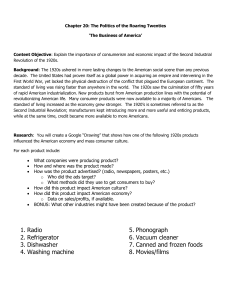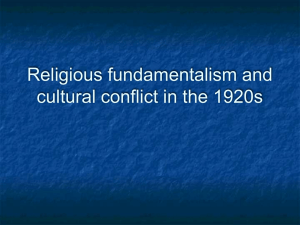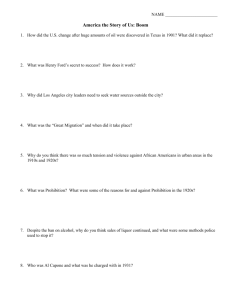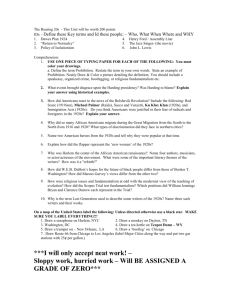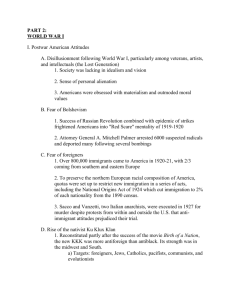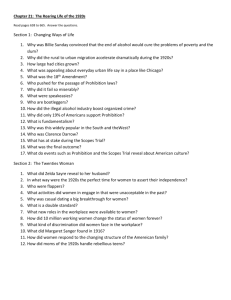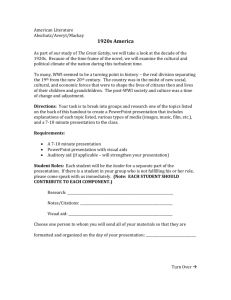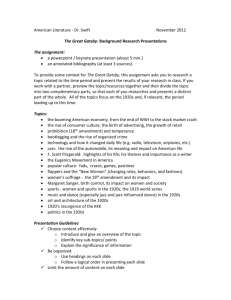1920s DBQ
advertisement
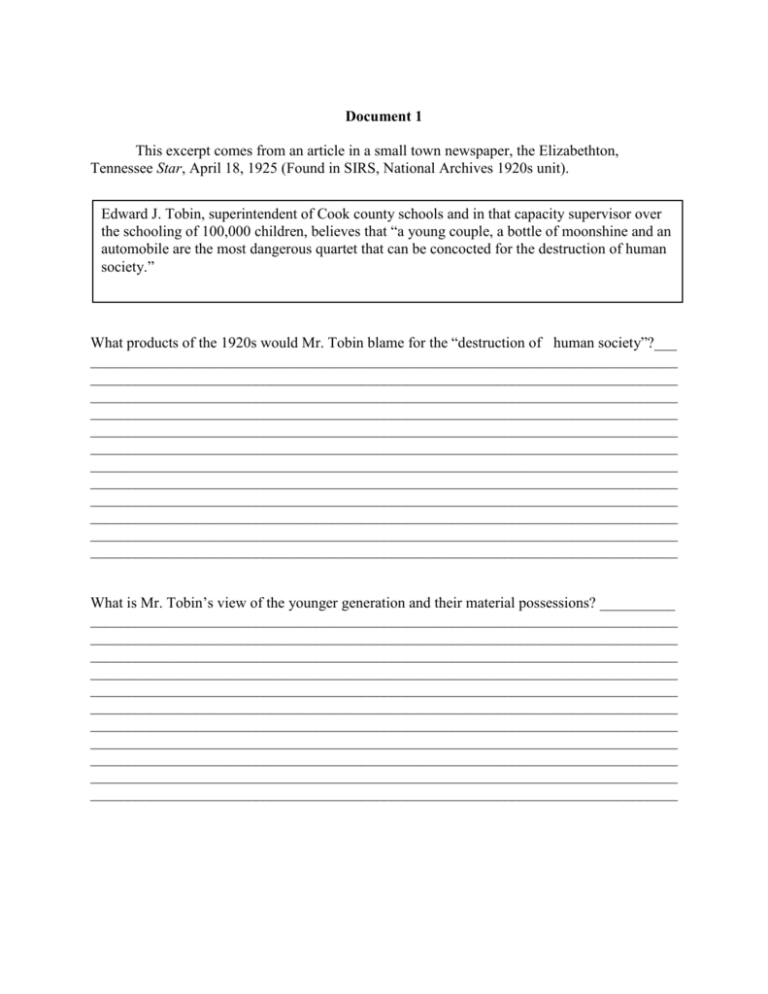
Document 1 This excerpt comes from an article in a small town newspaper, the Elizabethton, Tennessee Star, April 18, 1925 (Found in SIRS, National Archives 1920s unit). Edward J. Tobin, superintendent of Cook county schools and in that capacity supervisor over the schooling of 100,000 children, believes that “a young couple, a bottle of moonshine and an automobile are the most dangerous quartet that can be concocted for the destruction of human society.” What products of the 1920s would Mr. Tobin blame for the “destruction of human society”?___ ______________________________________________________________________________ ______________________________________________________________________________ ______________________________________________________________________________ ______________________________________________________________________________ ______________________________________________________________________________ ______________________________________________________________________________ ______________________________________________________________________________ ______________________________________________________________________________ ______________________________________________________________________________ ______________________________________________________________________________ ______________________________________________________________________________ ______________________________________________________________________________ What is Mr. Tobin’s view of the younger generation and their material possessions? __________ ______________________________________________________________________________ ______________________________________________________________________________ ______________________________________________________________________________ ______________________________________________________________________________ ______________________________________________________________________________ ______________________________________________________________________________ ______________________________________________________________________________ ______________________________________________________________________________ ______________________________________________________________________________ ______________________________________________________________________________ ______________________________________________________________________________ Document 2 One of the most engaging histories of the 1920s is Only Yesterday: An Informal History of the 1920s by Frederick Lewis Allen (Harper & Row, 1929,1964). The following excerpt from this book (p.168) describes the 1925 case of John Scopes, a young biology teacher in Dayton, Tennessee, who was charged with violating the state law prohibiting the teaching of evolution. There was something to be said for the right of the people to decide what should be taught in their tax-supported schools, even if what they decided upon was ridiculous...In the eyes of the public, the trial was a battle between Fundamentalism on the one hand and twentieth century skepticism (assisted by Modernism) on the other... It was a strange trial. Into the quiet town of Dayton flocked gaunt Tennessee farmers and their families in mule-drawn wagons and ramshackle Fords; quiet, godly people in overalls and gingham and black, ready to defend their faith against “foreigners,” yet curious to know what this newfangled evolutionary theory might be. What were the two sides in the Scopes trial? __________________________________________ ______________________________________________________________________________ ______________________________________________________________________________ ______________________________________________________________________________ ______________________________________________________________________________ ______________________________________________________________________________ ______________________________________________________________________________ ______________________________________________________________________________ ______________________________________________________________________________ ______________________________________________________________________________ ______________________________________________________________________________ ______________________________________________________________________________ What groups, ideas and behaviors do you think the Tennessee farmers grouped into the category of “foreigners”? ________________________________________________________________ ______________________________________________________________________________ ______________________________________________________________________________ ______________________________________________________________________________ ______________________________________________________________________________ ______________________________________________________________________________ ______________________________________________________________________________ ______________________________________________________________________________ ______________________________________________________________________________ ______________________________________________________________________________ ______________________________________________________________________________ ______________________________________________________________________________ Document 3 This is a quote from the novel, This Side of Paradise, by F. Scott Fitzgerald published in April, 1920. None of the Victorian mothers —and most of the mothers were Victorian — had any idea how casually their daughters were accustomed to be kissed. Why might the Victorian mothers not have been aware of how “accustomed to be kissed” their daughters had become? __________________________________________________________ ______________________________________________________________________________ ______________________________________________________________________________ ______________________________________________________________________________ ______________________________________________________________________________ ______________________________________________________________________________ ______________________________________________________________________________ ______________________________________________________________________________ ______________________________________________________________________________ ______________________________________________________________________________ ______________________________________________________________________________ ______________________________________________________________________________ In addition to kissing, what other behavior might the Victorian mothers have found shocking if they were aware of them? ________________________________________________________ ______________________________________________________________________________ ______________________________________________________________________________ ______________________________________________________________________________ ______________________________________________________________________________ ______________________________________________________________________________ ______________________________________________________________________________ ______________________________________________________________________________ ______________________________________________________________________________ ______________________________________________________________________________ ______________________________________________________________________________ ______________________________________________________________________________ Document 4 This cartoon was published in the Chicago Daily Tribune, August 23, 1924. What are some of the “everything in the world” that the generation of the 1920s had? How did these items affect their lives? ______________________________________________________ ______________________________________________________________________________ ______________________________________________________________________________ ______________________________________________________________________________ ______________________________________________________________________________ ______________________________________________________________________________ ______________________________________________________________________________ ______________________________________________________________________________ ______________________________________________________________________________ ______________________________________________________________________________ ______________________________________________________________________________ ______________________________________________________________________________ What is the cartoonist implying about “This Generation”?_______________________________ ______________________________________________________________________________ ______________________________________________________________________________ ______________________________________________________________________________ ______________________________________________________________________________ ______________________________________________________________________________ ______________________________________________________________________________ ______________________________________________________________________________ ______________________________________________________________________________ ______________________________________________________________________________ ______________________________________________________________________________ ______________________________________________________________________________ The 1920s Mr. Knisely The Roaring Twenties was a time of contrast following on the heels of the Great War and the 1919 Pandemic. The 1920s was also a time of dramatic changes in the way people lived, worked and entertained themselves. It was a new age for women after the reforms of the early century and obtaining the right to vote in 1919. The prosperity of the cities was contrasted to the decline and despair of the rural countryside. Traditional values were being assaulted by jazz, materialism, immorality and subverted by new modern values. It seemed as if automobiles, radios, movies, advertising, consumer credit and other new realities were destroying traditional American values. Outside assaults on our way of life seemed to threaten from Europe as well. The following terms are from our readings on this era. They are grouped into six categories. You are required to use two items from each category (underline them in your essay, one point each) and the following documents to answer the following question: Describe how the 1920s were a period of dramatic change and clashes over issues of values and beliefs. Sacco & Vanzetti Palmer raids Boston police strike return to normalcy Flapper demographics mass media Jazz Age Harlem Renaissance Lost Generation Harding Coolidge Hoover isolationism quota Red Scare Bootlegger prohibition speakeasy Teapot Dome scandal Laissez faire installment plan consumer economy Fundamentalism Scopes trial Ku Klux Klan Marcus Garvey
